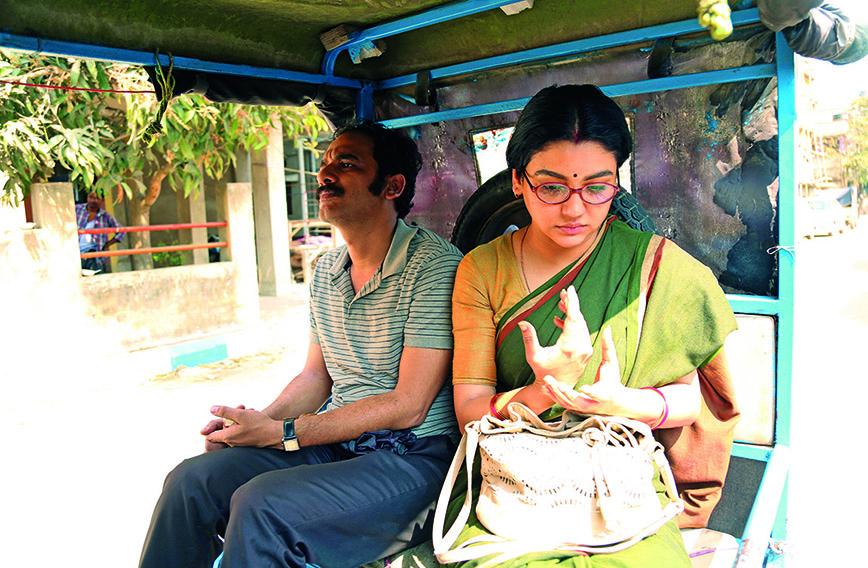
10 Bengali films worth watching
Saibal Chatterjee, New Delhi
Cinema's greats like Satyajit Ray, Ritwik Ghatak and Mrinal Sen once held Bengali cinema’s flag aloft on the global stage. But over the years, the film industry in Kolkata has gone strangely insular. Stories that it puts on the screen these days skim the surface of the state’s social and cultural diversity. But all may not be lost. Outside the charmed circle of Kolkata’s multiplex mavens, a breed of writer-directors — several of them, encouragingly, debutants — hasn’t given up the fight. They foray into areas, experiences and themes that challenge them and their audience, and deliver gems. Such films aren’t easy to find because the distribution system is predisposed against them. Saibal Chatterjee has drawn up a list of 10 films — produced in the last three years — that prove that the spirit of creative adventure isn’t dead and buried in Bengal. Most of these titles are available on streaming platforms. Watch them right away if you haven’t already. Those that aren’t currently available are months, if not weeks, away from landing in our midst. Seek them out.
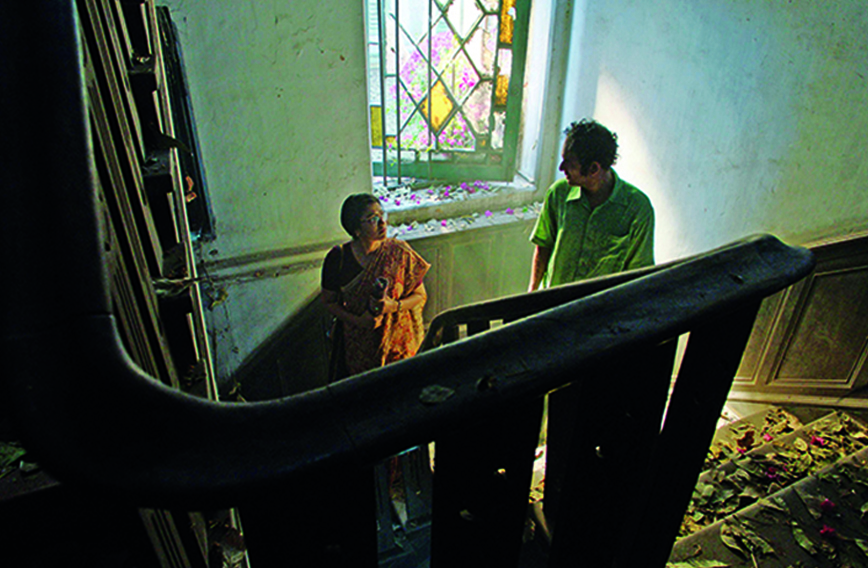
Ananta (2020) The Eternal
Director: Abhinandan Dutta
FRESH off the oven, Ananta has yet to reveal itself to the world. But it is a film that simply has to be on this list, such is its quality. First-time director Abhinandan Dutta captures the monotony of urban life in the daily chores of Shubho (Ritwik Chakraborty), an out-of-work young man who has inherited an ancestral house that fetches him enough money by way of rent to make ends meet, and Mishtu (Sohini Sarkar), a schoolteacher who lives with an alcoholic father. Both are emotionally scarred individuals on whom time weighs heavy. They seek to lose themselves in the routine circularity of their day. From his balcony, Shubho watches Mishtu go to work every morning.
At a specific time of day every afternoon, the two cross each other fleetingly on a staircase strewn with autumn leaves but they do not exchange any words. A connection between the two is suggested but the meetings do not translate into a fully expressed relationship. A lyrical, empathetic rumination on loss, longing and waiting, Ananta has a rich soundtrack designed to denote the inexorable passage of time even as the lives of Shubho and Mishtu seem to be poignantly stagnant. A ticking clock, running trains, flowing water, clucking pigeons, other sounds of nature and a wide variety of musical instruments orchestrated to create an immersive aural wraparound. Ananta is a story of a love that is like a gurgling stream in eternal flow. You can dip your hands into it but you cannot grasp it within your palm. The film is pretty much the same.
(Not streaming yet)
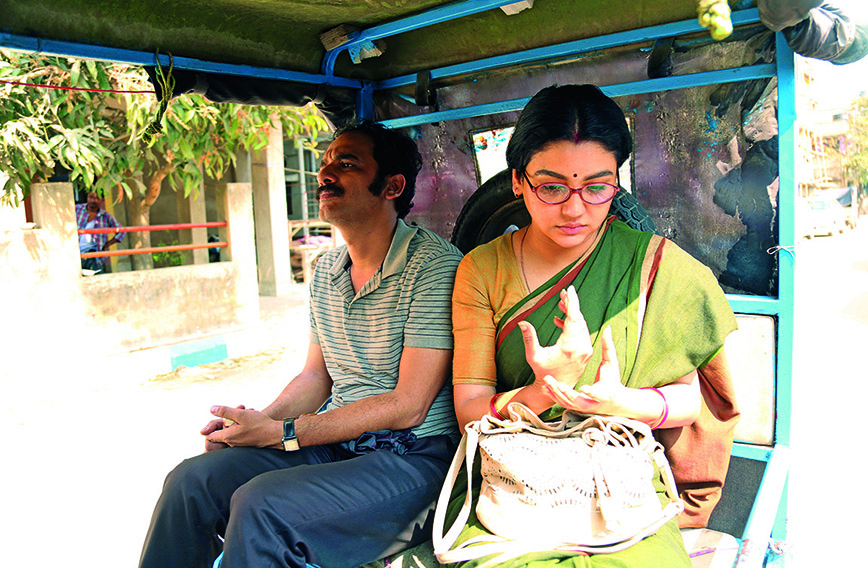
Binisutoy (2019) Without Strings
Director: Atanu Ghosh
AN instantly striking variation on the theme of urban alienation, the delectable Binisutoy sees director Atanu Ghosh exploring the minds of two seemingly successful city-bred individuals through the stories they spin about themselves to get away from the soullessness of their existence. Is living a lie, even if only momentarily, a good enough refuge from the angst brought on by societal expectations and family responsibilities? Perhaps not, but for Srabani Barua (Jaya Ahsan), general manager of a tea company owned by her family, and Kajal Sarkar (Ritwik Chakraborty), a senior executive in a construction firm, it is an act of defiance, of liberation, of assertion. Nothing may come out of the personas and the yarns they weave. Yet the effort is worth it. Ghosh adopts a tone that blurs the line between the teasing and tantalizing on the one hand and the contemplative and poignant on the other. At once enchanting and intriguing in a quiet, genteel sort of way, Binisutoy reveals the inner worlds of the two principal characters through subtle twists rather than grand gestures.
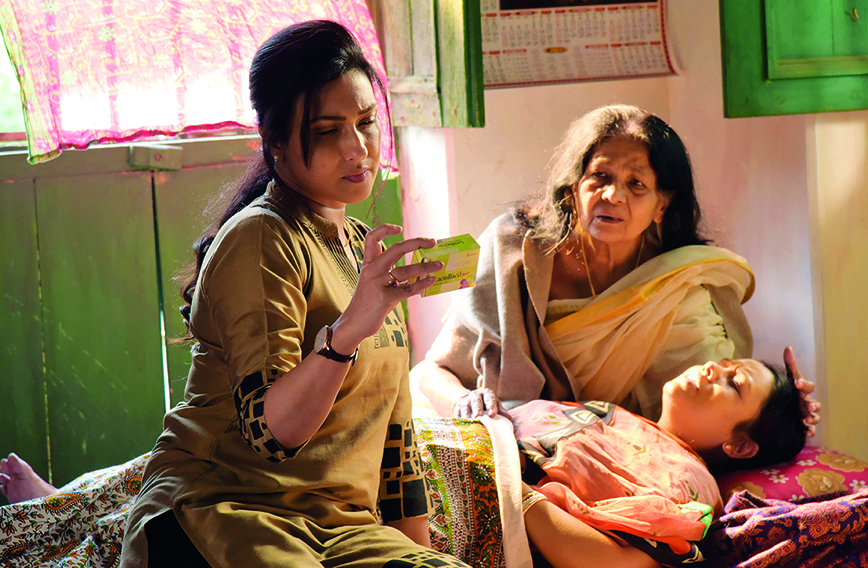
Parcel (2020)
Director: Indrasis Acharya
UPTURNING the conventions of a tale of mystery and suspense, director Indrasis Acharya, in his third film, probes the impact of surprise revelations on the relationship of an apparently well-adjusted middle-class couple in Kolkata. Both are doctors although the wife (played by Rituparna Sengupta, also the film’s producer) has quit her practice. They have a musically-inclined little daughter. Everything seems to be coasting along nicely when the woman begins to receive parcels (with photographs, flowers and other articles) from a mystery source. As secrets of her past threaten to tumble out into the open, the wife is compelled to take stock of her own life, her relationships and the society she lives in. In a unique manner, Acharya dovetails the personal tale into the larger realities of the times. The film delves into aspects of the anxieties triggered by the act of getting through life in an urban expanse bursting at the seams and struggling to sustain its civic support systems — here, the city’s shaky healthcare infrastructure is under the spotlight. Average Bengali films are literal-minded and overly committed to cause-and-effect plotting. Parcel isn’t an average film, Bengali or otherwise. It offers no easy closure, leaving us with the questions that it asks. Expect no pat answers from Parcel.
(Parcel was theatrically released just before the COVID-19 pandemic shut down cinema halls. Not streaming yet, but you can catch Indrasis Acharya’s previous two films, both exceptional — Bilu Rakkhosh on Netflix and Pupa on Amazon Prime).
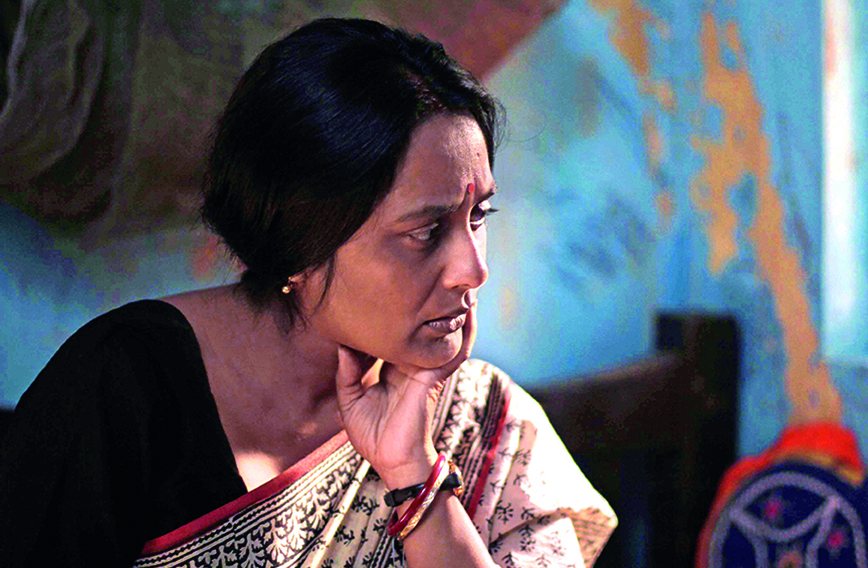
Mayar Jonjal (2020) Debris of Desire
Director: Indranil Roychowdhury
ANOTHER brand-new Bengali film, Mayar Jonjal premiered recently at the Shanghai International Film Festival, the first post-pandemic event to be held physically. It marks a return to the big screen for Indranil Roychowdhury, who burst on the scene in 2013 with the critically acclaimed Phoring. Mayar Jonjal is a powerful diptych adapted from two stories by Bengali writer Manik Bandopadhyay. The film, an Indo-Bangladeshi co-production, takes a long, hard look at Kolkata’s underbelly as it probes the effects of neo-liberalism and self-seeking politics on those struggling to survive on the fringes of a rapidly developing city. The two stories it narrates are peopled by gangsters, land sharks, small-time criminals, prostitutes, unpaid factory workers and maidservants, all pushed to the brink by poverty and other misfortunes. A conman feigns love for a sex worker (Chandreyee Ghosh), a migrant from across the border, and hopes to swindle her of her savings. A lower middle-class family man and low-level political worker (Ritwik Chakraborty) is troubled by the fact that his wife (Bangladeshi actress Aupee Karim, making a comeback after a long hiatus) has begun to work as a maidservant in a high-end condominium. The paths of the two men cross. The consequences are disastrous. Mayar Jonjal is a story of greed and hope, misogyny and misuse of power. Above all, it is a cautionary tale about a world on the brink of an implosion.
(Not streaming yet)

Nirontor (2020) The Prologue
Director: Chandrasish Ray
CHANDRASISH Ray’s debut film is a character-driven drama in which the focus is more on the characters than on the drama. Its introspective quality infuses the film with a deeply affecting, melancholic air. A middle-aged engineer, played by Prosenjit Chatterjee, who has bankrolled the film, travels to a hill location with an assistant (Satyam Bhattacharya) to look for a plot for a new holiday resort. But the purpose of the trip soon takes a backseat as the relationship between the two colleagues, which starts off on the wrong foot, begins to evolve into one of affection, trust and bonhomie. One man carries the burden of the past, the other looks to the future with trepidation. The two reveal themselves to each other, bit by bit. And then fate intervenes. Life takes a new turn back in Kolkata. The debutant director handles the material with impressive panache, never overreaching, never stretching a point too far. Nirontor is a mellow exploration of two generations negotiating with each other. Beautifully shot by cinematographer Soumik Haldar, the film lingers on the beauty of the mountain locations and the deserted night time street that runs through a residential big-city locality with equal vibrancy.
(Streaming on Zee5)

Raahgir (2009) The Wayfarers
Director: Goutam Ghose
THIS is the odd one out. Raahgir isn’t a Bengali-language film but it is the latest work of Bengal’s Goutam Ghose. It is the 70-year-old director’s first Hindi-language film since Yatra (2006). In Raahgir, he is back among the most marginalized people of rural India through a story that, in contrast to Maa Bhoomi, Dakhal and Paar, underscores the goodness of the human spirit amid crushing poverty and deprivation. His early-career explorations of rural distress were marked by anger and despair. The plaintive tone of Raahgir is tempered with profound humanism mirrored in the solidarity that the dispossessed build among themselves as a defence mechanism. The film also looks for beauty and brightness amid an air of gloom. Raahgir brings together three of the finest screen actors of our times — Adil Hussain, Tillotama Shome and Neeraj Kabi — in a restrained drama that probes the ramifications that privation has on individuals who are condemned to exist at subsistence level. The screenplay, written by Ghose and Jagannath Guha, examines how the protagonists hold on to the kindness of strangers and are united by hunger.
(Raahgir, which had its world premiere at the Busan International Film Festival in 2019, is not yet on a streaming platform)
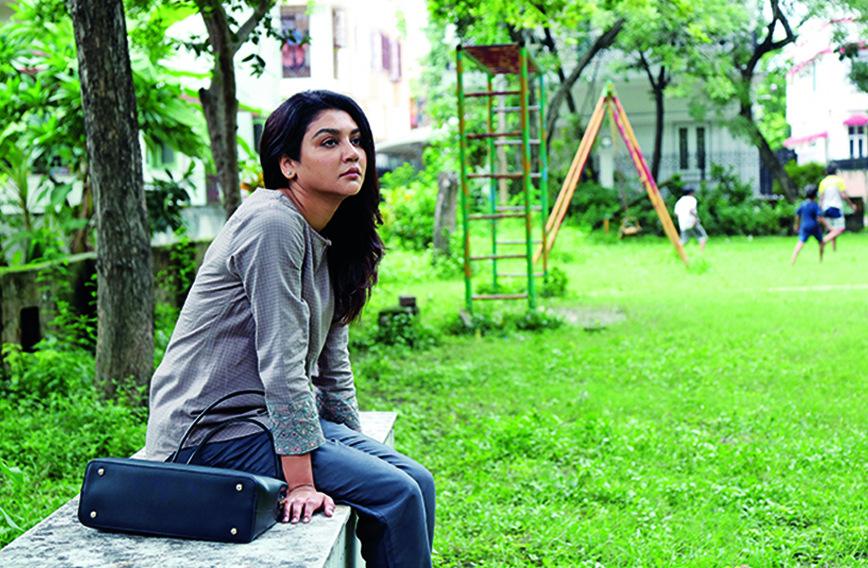
Robibaar (On a Sunday)
Director: Atanu Ghosh
ATANU Ghosh’s second entry on this list of unmissable Bengali films is an understated romance with the heart of a complex and demanding psychological drama. The two-hander unfolds in the course of a single day but takes into its sweep a time-frame that spans at least 15 years. Without resorting to any conventional means — either flashbacks or verbose conversations — the brilliantly scripted film places before the audience the past and present of a man-woman relationship that is beyond repair and yet is worth our attention. The two individuals who have drifted apart seek, from their respective standpoint, either escape or engagement. Sayani (Jaya Ahsan) is a law officer in a corporate firm. She is writing a book on white-collar crimes. Asimabha (Prosenjit Chatterjee), with whom she broke up amid bitterness 15 years ago, is a loner and a fraudster with nine pending cases of cheating and forgery against him. The non-judgmental Robibaar examines a soured affair that can now only be salvaged if Sayani and Asimabha can put the past behind them and strike a deal with each other. It is a film about forgetting and mending. But is either even possible? While Appu Prabhakar’s camera captures Kolkata and its surroundings in shifting luminescence as dawn turns to high noon, and evening gives way to night, a very sophisticated musical score by Debojyoti Mishra highlights the fissures that separate the protagonists. Robibaar has gotten as close to being a masterpiece as any Bengali film in recent years.
(Streaming on www.hoichoi.tv)
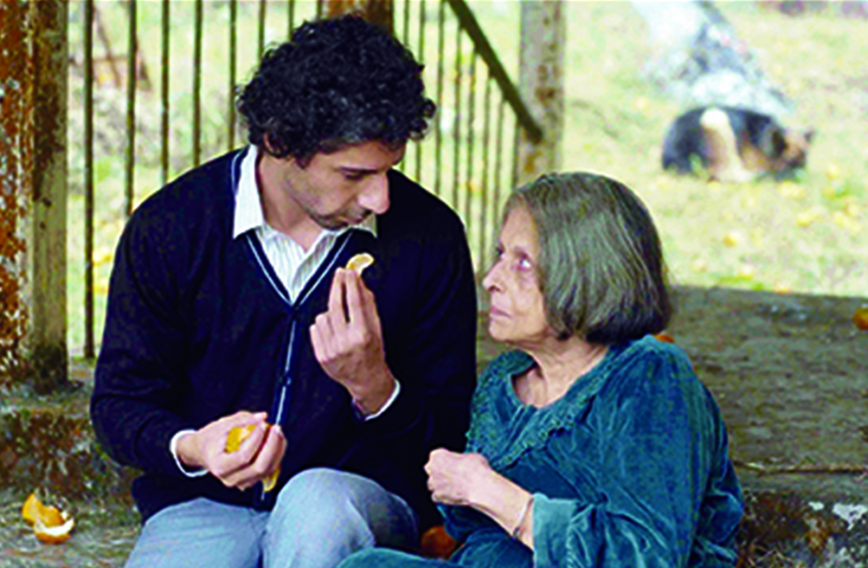
Jonaki (2018)
Director: Aditya Vikram Sengupta
JONAKI is Aditya Vikram Sengupta’s sophomore effort, a work for the ages. The filmmaker won instant admirers with his 2014 dialogue-less debut Asha Jaoar Majhe (Labour of Love). In Jonaki, he goes several steps forward in search of his own idiom, employing heightened reality and complex dreamscapes to probe love, loss, death, grief and social decay. The result is a film of stunning images and beautiful moments that blend hypnotic surrealism with visual poetry. Built with remembrances of stories that his grandmother told the director, Jonaki paints a portrait of the life of a woman whose quest for happiness and fulfilment were thwarted by an affluent family dangling between western values and social conservativism. A domineering mother, a father who dies prematurely, a love affair erased, a teenage marriage… all part of a chronicle resting on snatches of memory.
(Jonaki streams on Netflix)
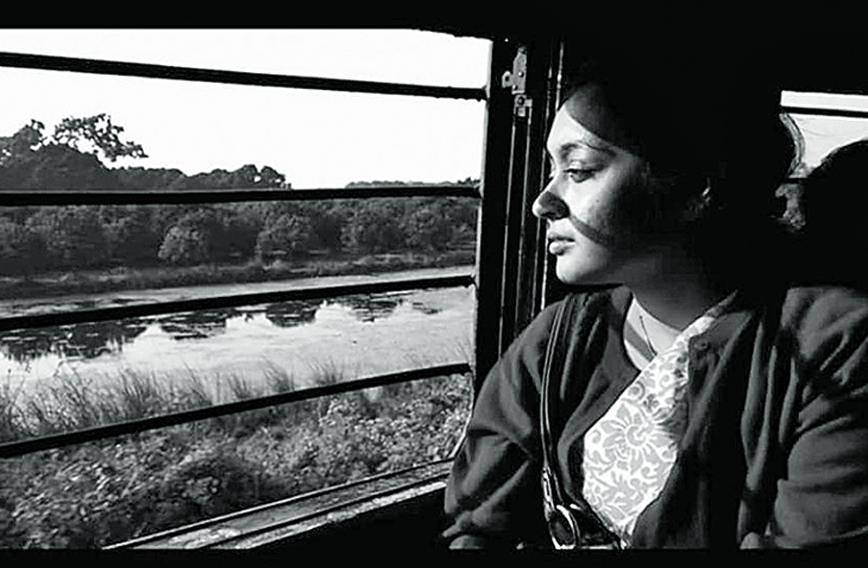
Ami O Manohar (2018) Manohar and I
Director: Amitabha Chaterji
SHOT in black and white on an iPhone (mostly in available light) by cinematographer Modhura Palit, Ami O Manohar is a self-assured, exquisitely composed study of loneliness. The film’s protagonist is a young working woman who lives with her elder sister. On the way back to her suburban home every day, she meets a man who is months away from retirement. It becomes a daily routine. They talk. The man says he is happily married. The girl claims she has a boyfriend. Neither is speaking the truth. Pretence is the cloak they don to conceal the drudgery of their lives. The man does most of the talking, the girl listens, volunteering personal information only sparingly. They seek solace in memory and imagination. But can they wish away their ennui-filled present? Substance and form coalesce perfectly in Ami O Manohar, composed of languid, static single takes that convey the burden of inescapable reality. Director Amitabha Chaterji’s first film carves out ‘spaces’ and moments in time that convey the emptiness of hollowed-out lives in a manner that is not only universal but also vividly expressive. He employs means that are purely imagistic and relies on suggestion rather than explication to tell his story of three enervated souls clinging on to what is lost and seeking to conjure up, in their minds, what is desired.
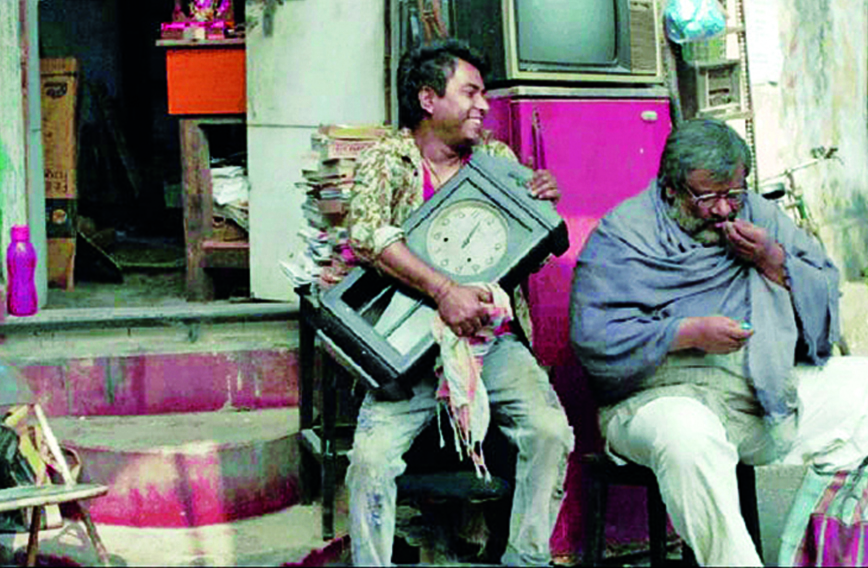
Kedara (2019)
Director: Indraadip Dasgupta
MUSIC composer Indraadip Dasgupta’s directorial debut is remarkable in every respect. Bolstered by a phenomenal lead performance by Kaushik Ganguly and a fabulous background score by Bollywood’s premier male singer, Arijit Singh, Kedara is about an ageing ventriloquist who lives alone in a dilapidated ancestral home in a middle-class Kolkata neighbourhood. Both the man and his calling have been left behind by time. He seeks refuge in a world that he creates for himself. He mimics the voices of his departed dear ones and converses with them to while away his time. His wife has left him. He is ridiculed by the wastrels at the local tea stall. His only friend, a junk dealer, gifts him an ornate kedara (armchair). It sparks a transformation. He acquires a new sense of confidence. His own world changes, but the world outside, represented by political goons who have their eyes on a part of his house, has only gotten worse. Filled with surreal touches, marked by a storytelling style that eschews superficial methods and backed by phenomenally evocative sound design, Kedara is an out-of-the-ordinary cinematic achievement.
(Available on www.hoichoi.tv)
Comments
-

Sujit Chakraborty - Oct. 17, 2020, 9:20 p.m.
I have seen none of the films Saibal Chatterjee has written about, as somehow I have got cut off from the excitement of Calcutta's cultural life. But, as expected of his high standards, Saibal brings out the fine details of each film and the emerging kaleidoscope of a rebirth of Bengali films. Huge thanks to him. I have now promised myself that I will watch each of these films sooner than later. Thanks to your magazine and to Saibal.
-

Jairam Bajaj - Oct. 17, 2020, 6:52 p.m.
Most of these films are not even streaming right now so how one can see them?



